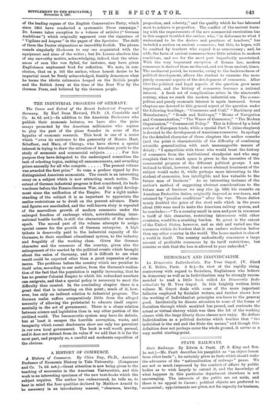A HISTORY OF COMMERCE.
A History of Commerce. By Clive Day, Ph.D., Assistant Professor of Economic History in Yale University. (Longmans and Co. 7s. 6d. net.)—Great attention is now being given to the teaching of economics in the American Universities, and this work is an interesting specimen of the new text-books which the subject requires. The author has endeavoured, be tells us, to bear in mind the four qualities declared by Matthew Arnold to he necessary in an introductory manual, "clearness, brevity, proportion, and sobriety," and the quality which he has laboured most to achieve is proportion. The conflict of the ancient learn-
ing with the requirements of the new commercial curriculum has in this respect troubled the author, who, "in deference to what I understand to be the desires and practices of teachers," has included a section on ancient commerce; but this, he hopes, will be omitted by teachers who regard it as unnecessary ; and, he adds, the facts of ancient commerce have little relation to modern conditions, and are for the most part imperfectly ascertained. With the very important exception of Roman law, modern commerce is derived from mediaeval, and not from ancient, times. The mediaeval period, he remarks, owing to the backwardness of political development, allows the student to examine the more purely economic aspects of the development of commerce. After 1500 the political and legal aspects of the question grow more important, and the history of commerce becomes a national interest. A fresh set of complications arises in the nineteenth century, when we reach the modern industrial era. The cosmo- politan and purely economic interest is again increased. Seven chapters are devoted to this general aspect of the question under the following headings : "Commerce and Coal," "Machinery, and Manufactures," "Roads and Railways," "Means of Navigation and Communication," "The Wares of Commerce," "The Modern Organisation," "Commercial Policy." This is followed by a brief review of European trade, while a special Part V. (nine chapters) is devoted to the development of American commerce. In apology for the detailed character of these chapters the author remarks (and the point is characteristic of the difficulty of combining scientific generalisation with such unmanageable masses of detail) : "I sympathise with those who would treat the history of commerce from the institutional standpoint and who may complain that too much space is given to the narrative of the commercial progress of the different political groups. I am inclined to think, however, that a more abstract treatment of the subject would make it, while perhaps more interesting to the student of economics, less intelligible and less valuable to the future man of business." As an interesting instance of the author's method of suggesting abstract considerations to the future man of business we may cite (p. 569) his remarks on American Protective duties, originally imposed as war-taxes, and retained by "peculiar conditions" after the war. These dutiee nearly doubled the price of the steel rails which in the years about 1880 were used to make the American railway system, and ho concludes :—" To a country small in area and poor in resources a tariff of this character, restricting intercourse with other countries, would be a crushing burden. So great is the extent of the United States, however, and so rich and varied are the resources within its borders that it can endure seclusion better than any other country in the world. The home market is almost a world in itself. The country undoubtedly renounces a large amount of profitable commerce by its tariff restrictions, but remains so rich that the loss is allowed to pass unheeded."






























































 Previous page
Previous page